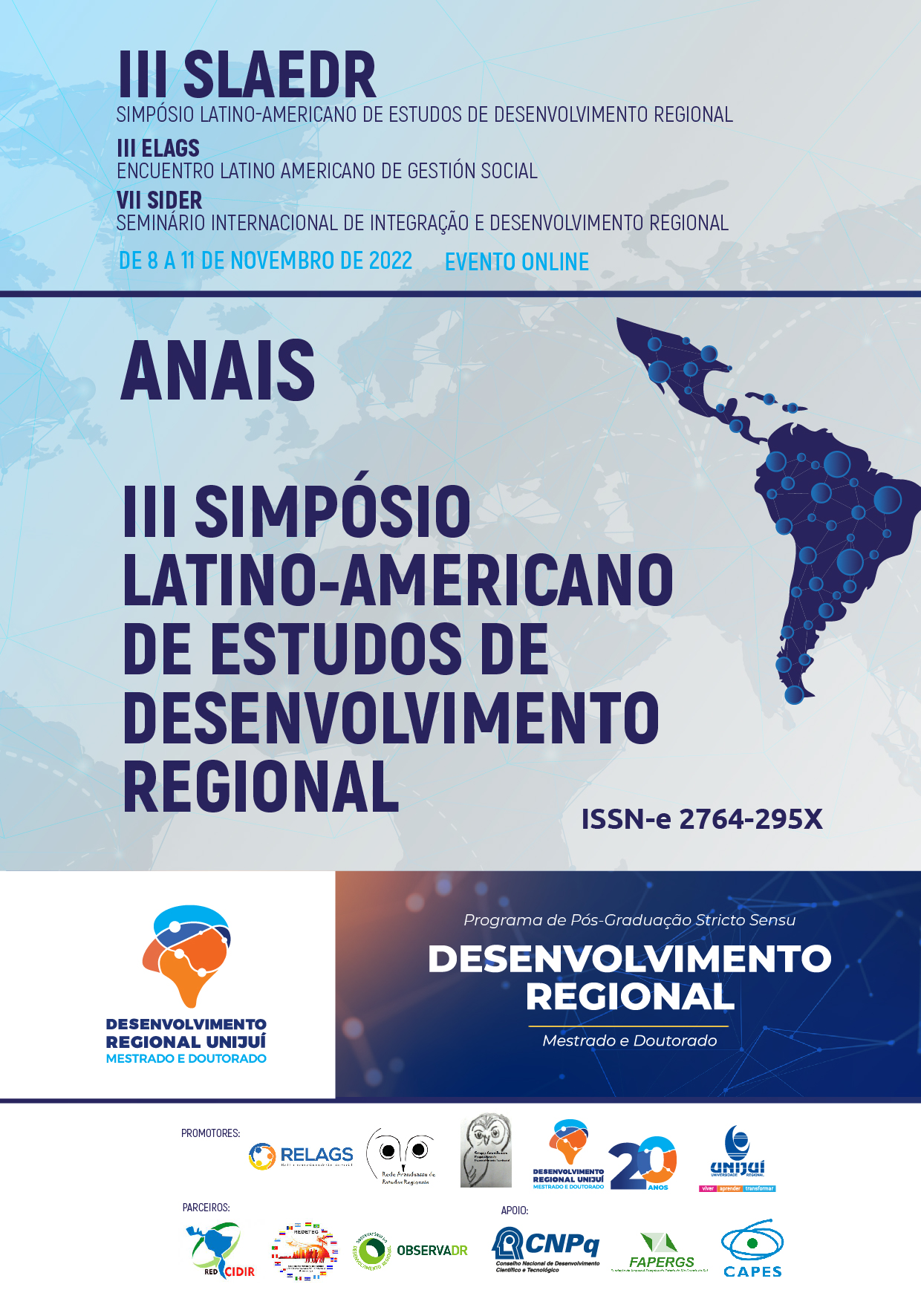SUSTAINABILITY AND NATIONAL STRATEGIES FOR SMART CITIES: RELATIONSHIPS BETWEEN THE 2030 AGENDA, BRAZILIAN CHARTER FOR SMART CITIES AND THE NATIONAL POLICY ON SMART CITIES
Keywords:
Sustainable Development Goals, Public Policy, Regional DevelopmentAbstract
Sustainability and smart cities are topics that are gaining increasing relevance in academic research and are often interrelated. The themes are important and address a new pattern of development and organization for society. The 2030 Agenda and its sustainable development goals (SDGs) establish the main references on the subject worldwide. In Brazil, there are several initiatives that are connected to a greater or lesser degree with the theme, the national strategies for smart cities, represented by the Brazilian Charter for Smart Cities (CBCI) and by the proposal for the National Policy for Smart Cities (PNCI), are public policies that are adept of these principles. Each nation has its particular context and must adapt these guidelines, so the present work aims to identify how the concept of sustainability and the SDGs translate into strategies in Brazilian agendas for smart cities. The documents that formalize the proposals were analyzed using the Content Analysis technique. The results found confirm the high level of adherence to the SDGs. It emerges from the analysis that actions in the perspective of SDGs 9, 11, 16 and 17 establish the emphasis of national proposals. The PNCI reinforces the adoption of strategies for the educational development of people, aiming to qualify those who are the main actors responsible for the intelligence of the city. On the other hand, the CBCI, although it also addresses the social and human aspect, emphasizes the theme of digital transformation, which led to the construction of a document with a more technical and specific repertoire.
References
ALVAREZ, Cristina Engel de; SALZANI, Lívia Campos. A relação entre as produções científicas e o desenvolvimento das Cidades Inteligentes brasileiras. arq.urb, [s. l.], n. 24, p. 44–59, 2019. Disponível em: https://revistaarqurb.com.br/arqurb/article/view/50. Acesso em: 4 jan. 2022.
AUNE, Anne. Human Smart Cities – O cenário brasileiro e a importância da abordagem joined-up na definição de Cidade Inteligente. 2017. Dissertação (Mestrado em Engenharia Urbana e Ambiental) - Pontifícia Universidade Católica do Rio de Janeiro, Rio de Janeiro, 2017. Disponível em: https://www.maxwell.vrac.puc-rio.br/colecao.php?strSecao=resultado&nrSeq=32955@1.
BARDIN, Laurence. Análise de Conteúdo. São Paulo: Edições 70, 2016.
BRASIL. CÂMARA DOS DEPUTADOS. Projeto de Lei no 976, de 19 de março de 2021. Institui a Política Nacional de Cidades Inteligentes (PNCI), com vistas à melhoria da qualidade de vida dos munícipes, e dispõe sobre os princípios e diretrizes que a nortearão, os seus objetivos, as ações a serem realizadas, os recursos alocáveis e dá outras providências. Brasília: Câmara dos Deputados, 2021. Disponível em: https://www.camara.leg.br/proposicoesWeb/fichadetramitacao?idProposicao=2274449. Acesso em: 4 abr. 2021.
BRASIL. MINISTÉRIO DO DESENVOLVIMENTO REGIONAL. Carta Brasileira para Cidades Inteligentes. Brasília: Ministério do Desenvolvimento Regional, 2021. Disponível em: https://www.gov.br/mdr/pt-br/assuntos/desenvolvimento-regional/projeto-andus/Carta_Bras_Cidades_Inteligentes_Final.pdf. Acesso em: 9 jan. 2022.
COMISSÃO MUNDIAL SOBRE O MEIO AMBIENTE E DESENVOLVIMENTO. Nosso Futuro Comum. Rio de Janeiro: Editora da Fundação Getúlio Vargas, 1991.
CUNHA, Maria Alexandra et al. Smart Cities - Transformação Digital de Cidades. São Paulo: Programa Gestão Pública e Cidadania, 2016. E-book. Disponível em: https://bibliotecadigital.fgv.br/dspace/handle/10438/18386%0Ahttp://www.smartcities.es/smart-cities/.
GEHL, Jan. Cidades para Pessoas. São Paulo: Perspectiva, 2013.
GIL, Antonio Carlos. Como elaborar projetos de pesquisa. São Paulo: Atlas, 2002.
GUIMARÃES, José Geraldo de Araújo. Cidades inteligentes: proposta de um modelo brasileiro multi-ranking de classificação. 2018. Tese (Doutorado em Administração) - Faculdade de Economia, Administração e Contabilidade. Universidade de São Paulo, São Paulo, 2018. Disponível em: https://teses.usp.br/teses/disponiveis/12/12139/tde-05072018-120958/publico/CorrigidoJoseGeraldo.pdf.
JOÃO, Belmiro do Nascimento; SOUZA, Crisomar Lobo de; SERRALVO, Francisco Antonio. Revisão sistemática de cidades inteligentes e internet das coisas como tópico de pesquisa. Cadernos EBAPE.BR, [s. l.], v. 17, n. 4, p. 1115–1130, 2019. Disponível em: https://bibliotecadigital.fgv.br/ojs/index.php/cadernosebape/article/view/74442. Acesso em: 7 jan. 2022.
LAZZARETTI, Kellen et al. Cidades inteligentes: insights e contribuições das pesquisas brasileiras. urbe. Revista Brasileira de Gestão Urbana, [s. l.], v. 11, 2019. Disponível em: http://www.scielo.br/j/urbe/a/3LscvBK8vN86Q3fyFvzx7Fw/?lang=pt. Acesso em: 8 jan. 2022.
LEITE, Carlos; AWAD, Juliana di Cesare Marques. Cidades Sustentáveis Cidades Inteligentes: desenvolvimento sustentável num planeta urbano. Porto Alegre: Bookman, 2012.
MONZONI, Mario; NICOLLETTI, Mariana. A Cidade para os Cidadãos: mobilidade, energia e a agricultura urbana. In: CAMPOS, Cesar Cunha (org.). Cidades Inteligentes e Mobilidade Urbana. Cadernos FGV Projetos. Ano 10, Noed. Rio de Janeiro: FGV Projetos, 2015. p. 90–107.
ONU - ORGANIZAÇÃO DAS NAÇÕES UNIDAS. Transformando Nosso Mundo: A Agenda 2030 para o Desenvolvimento Sustentável. [S. l.: s. n.], 2015. Disponível em: https://brasil.un.org/sites/default/files/2020-09/agenda2030-pt-br.pdf. Acesso em: 29 ago. 2022.
PINHEIRO JUNIOR, Luiz Pereira; CAVALHEIRO, Luciano Donizete. Smart Cities: a research agenda of the brazilian smart cities. In: INTERNATIONAL CONFERENCE ON INFORMATION SYSTEMS AN, 14., 2017, São Paulo. Anais do 14th INTERNATIONAL CONFERENCE ON INFORMATION SYSTEMS & TECHNOLOGY MANAGEMENT - CONTECSI. São Paulo: CONTECSI USP, 2017. p. 2115–2134. Disponível em: http://www.contecsi.tecsi.org/index.php/contecsi/14CONTECSI/paper/view/4646. Acesso em: 8 jan. 2022.
PIRES, Roberto Rocha Coelho; GOMIDE, Alexandre de ávila. Governança e capacidades estatais: uma análise comparativa de programas federais. Revista de Sociologia e Política, [s. l.], v. 24, n. 58, p. 121–143, 2016. Disponível em: http://www.scielo.br/j/rsocp/a/L3fXLK7DBfmxRf9jB6dmrSc/?lang=pt. Acesso em: 15 dez. 2021.
PORTO, André Gomyde et al. O Futuro é das chics: como construir agora as cidades humanas, inteligentes, criativas e sustentáveis. Brasília: IBCIHS, 2020. E-book. Disponível em: http://www.hids.unicamp.br/wp-content/uploads/2020/07/rbcih_0001_20_CHICS_o_livro_rev_07.pdf.
UNITED NATIONS, Department of Economic and Social Affairs. World Urbanization Prospects 2018: Highlights. [S. l.]: UN, 2019. E-book. Disponível em: https://www.unilibrary.org/content/books/9789210043137. Acesso em: 18 dez. 2021.
WEISS, Marcos Cesar. Cidades Inteligentes: proposição de um modelo avaliativo de prontidão das tecnologias da informação e comunicação aplicáveis à gestão das cidades. 2016. Tese (Doutorado em Administração) - Centro Universitário FEI, São Paulo, 2016.



